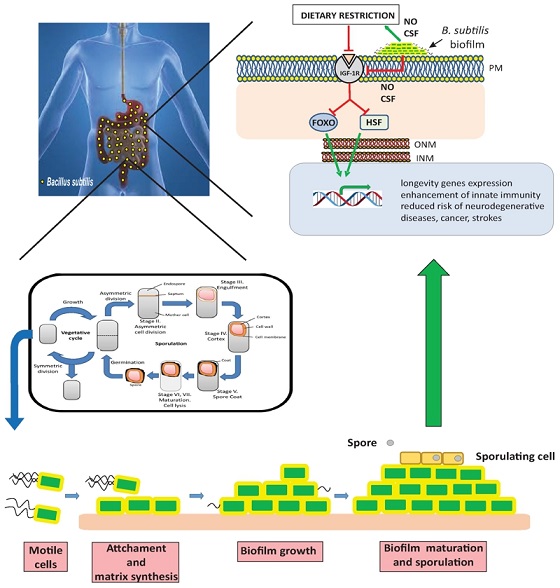Recently, the world of science has received amazing results in studying the effect of probiotics on life expectancy. In particular, the use of the bacterium Bacillus subtilis as a probiotic agent has shown that its presence in the intestines of the nematode Caenorhabditis elegans helps slow down the aging process. The researchers observed that strains of B. subtilis that were effective at forming biofilms improved the lifespan of these worms to a greater extent than strains that lacked the ability to form biofilms.
Bacteria living in biofilm are distinct from planktonic forms and can function as a coordinated community. They produce greater amounts of nitric oxide (NO) and the signaling pentapeptide CSF when cultured under biofilm-promoting conditions, highlighting the importance of biofilm in delaying aging.
Of particular note is that the beneficial effects of B. subtilis are associated with suppression of the insulin-like signaling system ILS, which is a fundamental aspect of healthy longevity in the concept of the human aging process. Thus, the results of the study provide reasons to consider the possibility of using B. subtilis in food and beverages as a potential way to prolong human life and prevent age-related diseases.
The study also sheds light on the mechanisms of longevity transmission through sensory pathways that regulate the aging process. Longevity pathways regulated by the transcription factors DAF-16 and HSF-1 suggest that increased lifespan in C. elegans is directly related to suppression of the ILS pathway. These results open new perspectives for understanding the aging process and improving quality of life.
Spores of the probiotic bacterium B. subtilis can be included in the daily diet and consumed to improve health and increase lifespan, according to a new study. As they pass through the stomach, the spores reach the intestines, where they begin to germinate and form a beneficial biofilm that actively interacts with the host cells. In particular, biofilm produces molecules such as nitric oxide (NO) and CSF, which have anti-aging effects.
At the genetic level, the anti-aging effect of B. subtilis is explained by the interaction of NO and CSF molecules with the insulin-like growth factor system, which leads to the activation of transcription factors responsible for disease resistance and life extension.
In addition to the existing dietary uses of B. subtilis, such as fermented soy products such as natto, which is traditionally consumed in Japan, scientists are considering including the probiotic in various types of foods. Given the high life expectancy in Japan and the role of genetic and environmental factors in the aging process, such inclusion may be considered one of the secrets to healthy longevity.
In the future, more in-depth research is expected to confirm the effectiveness of the probiotic B. subtilis in slowing down the aging process and maintaining good health in humans.
https://microbialcell.com/wordpress/wp-content/uploads/2017/03/2017A-Ayala-Microbial-Cell.pdf



